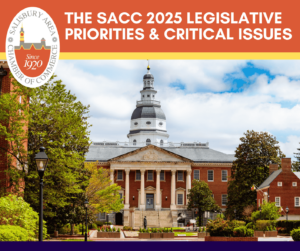
Advocating for the interests and concerns of its members is a pillar of the SACC mission and a hard-to-measure yet valuable member benefit. Successful advocacy is built on relationships and strength in numbers.
The SACC focuses on public policy issues that impact the business climate, builds credible, nonpartisan relationships with elected leaders, and makes connections among local business concerns and key decision-makers. Members are informed about relevant issues and provide input to leverage outcomes that promote economic development and job growth.
The SACC legislative priorities and critical issues for 2025 include:
- Cyber & Technology: Encourage and remove barriers to the critical deployment of broadband across the lower shore, including 5G accessibility. Ensure that the expansion process is transparent, competitive and market based to ensure equitable access to all parties. The SACC will closely monitor any policy that would reinstate rolled-back federal regulations on the internet that creates challenges and inconsistencies for businesses that work across state lines.
- Data Privacy: The SACC supports addressing the inconsistencies and compliance challenges that exist in the states data privacy law passed in the 2024 session compared to the laws adopted by our neighboring states. Addressing the inoperable components of the law ahead of the July 2025 effective date will provide certainty to Maryland’s business community and reduce the challenges of patchwork compliance in this complex regulatory area.
- Workforce Development: Expand the pool of apprenticeship and career technical education opportunities for the next generation of workers, while also simplifying the process to apply for a credit. The SACC also supports increasing the ratio of apprentices per regularly employed journeyperson in non-building trades. The SACC supports legislation protecting employers from certain liabilities associated with hiring justice-involved individuals.
- Energy and Environment: The SACC supports development of clean and renewable energy sources and transportation initiatives using market-based mechanisms and incentives while pushing for reasonable timetables. These key components limit the impact on the state’s economy and offer some safeguards to businesses and ensure protection for our manufacturing and transportation sectors. Transition to electrification, especially with aggressive timelines, could lead to increased cost burdens to businesses and ratepayers and strain the grid’s ability to handle increased demand. With the growing state budget deficit, we urge fiscal responsibility and a focus on cost-effective solutions that prioritize reliability and avoid placing excessive financial burdens on the state, ratepayers and businesses.
- Increasing Childcare Availability: In previous legislative sessions, the SACC supported legislation and budget opportunities to incentivize the opening of new childcare and the expansion of existing facilities. The cost and availability of childcare in 2025 remains a critical impediment to job growth and retention. The SACC supports all initiatives to address this issue.
- Paid Family Medical Leave Insurance Program: During the 2022 legislative session the Maryland General Assembly passed a paid family leave program inconsistent with any of the best practices and definitions used in other states. During the 2023 and 2024 sessions alterations including modifying definitions and delaying implementation were made to the legislation. Despite the changes, the SACC continues to have concerns regarding the program’s eligibility criteria. Specifically, allowing employees to qualify for the program after working 680 hours for ANY employer in the state will create challenges for workforce management. Additionally, we have not received clarification on provisions for self-employed individuals. The SACC continues to support legislation bringing Maryland’s FAMLI program in-line with the federal FMLA, bringing closer to a program that works for both employers and employees.
- Cannabis-Adult- Use Legalization: The SACC supports an employer’s right to maintain their existing testing and workplace policies and oppose any bans on testing or taking employment action because of test results. The Maryland General Assembly and the state must continue to consider the impacts on employers and Maryland’s workforce while implementing and regulating this policy.
- Taxation: The SACC supports tax policy reform that reduces the costs of doing business in Maryland. The SACC opposes the adoption of tax reapportionment schemes such as instituting the “throwback rule”. We oppose adopting mandatory unitary combined reporting, or any other system which creates a systematic and economic disadvantage for businesses. Combined reporting is particularly problematic in uncertain economic climates and will result in lower revenues for the state. We oppose any attempt to increase the tax on Maryland businesses organized as Pass Through Entities (PTE’s) who pay their business taxes as personal income. Maryland PTE’s are some of the state’s smallest businesses who already pay taxes at a higher rate than other personal income at 5.75%. Raising the rate to match the state Corporate Tax rate of 8.25% places our small businesses at a competitive disadvantage to those in our neighboring states. We oppose the expansion of the state sales tax on ANY services currently listed in Maryland law. The SACC supports a thorough examination of Maryland’s current de-coupling law related to the Federal tax structure and the advantages and disadvantages that exist.
- Civil Liability: The SACC believes the civil law system should not punish lawful commerce. The Chamber opposes any erosion or repeal of Maryland’s long-enacted caps on non-economic damages, as this would negatively impact the affordability and availability of liability insurance and expand liability exposure creating significant risks for Maryland businesses and reducing employment opportunities. The Chamber opposes any change to Maryland’s current standard for the award of punitive damages, especially a change that could increase the cost of doing business in the state. The Chamber supports maintaining Maryland’s long-standing doctrine of contributory negligence, a vital defense for businesses that limits liability exposure and provides a fair standard for allocating fault. The SACC opposes ANY effort to weaken or replace it with comparative fault, which would tip the current balance in the states fault allocations system, expand legal liability, and create additional risks for Maryland businesses.
- Education and Workforce Development: The SACC supports an educational and vocational ecosystem focused on developing, retaining and attracting a more globally competitive workforce. We support strategies that seamlessly link education and workforce development and embed skills-based learning into academics. The SACC continues to support the “Blueprint for Maryland’s Future” and urges legislative leaders to thoughtfully consider any alterations, based on budget constraints, that would eliminate any of the Blueprints key targeted goals.
- Transportation and Infrastructure: SACC supports policies that ensure state investment in all critical infrastructure projects, and all priorities to improve safe and efficient movement of people and goods. This includes addressing the state’s structural deficit and addressing the transportation needs of underserved communities. The State must address the Transportation Trust Fund (TTF) structural deficit, and the Chamber will support user fees that will solely be used for the network of projects that they were collected to fund. Regarding Vehicle Emission Reductions, the SACC supports any policies aimed at reducing greenhouse gases, but those reduction goals should take into account all of the costs, both direct and indirect, associated with implementation.
- Solvency of the Maryland Unemployment Trust Fund: The SACC supports efforts by the state to ensure a healthy balance on the unemployment insurance trust fund. Any new funding proposals must consider the economic landscape and cost implications for all businesses. Every effort should be made to evaluate potential changes against the programs of neighboring states so that Maryland businesses are not shouldered with excess burden compared to those in surrounding jurisdictions. Any new employer fees to cover UI administrative costs must be closely scrutinized to ensure they are fair, and equitable in relation to the existing taxes employers already pay into the trust fund.
- Regulatory Reform: Regulatory reform remains a critical component to attract and retain businesses. It is vitally important that the administration continue to remove red tape and job-killing regulations. Reforms in state Procurement and Permitting are essential to drive job creation, development, and economic growth.
The January 16th General Membership Luncheon will be held at the Wicomico Youth & Civic Center and feature Mary Kane, President & CEO of the Maryland Chamber of Commerce and Abbi Ludwig, Vice President of Marketing & Communications, who will present the challenges Maryland faces in 2025 and how Annapolis will respond.
Kane and Ludwig will discuss the following challenges and how Maryland leaders can work to make Maryland Competitive amidst a looming record state budget structural deficit:
– legislative considerations in 2025
– overall business friendliness in Maryland
– population dynamics
– tax policies
– business and job growth
– transportation and infrastructure
– utility costs
– broadband access
– water and sewer
Tickets are $35 for members and $45 for non-members and can be purchased at salisburyarea.com.




